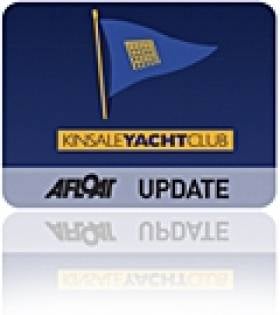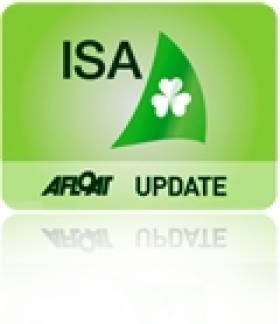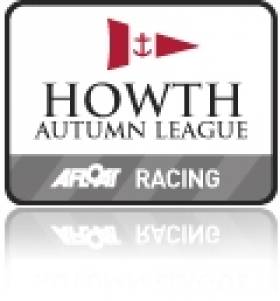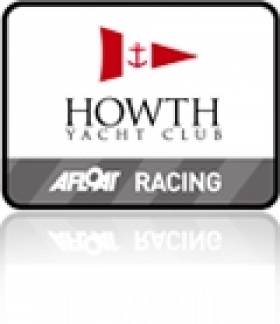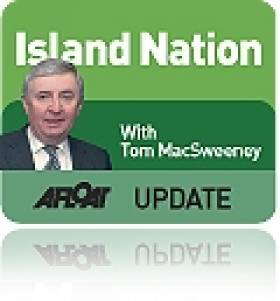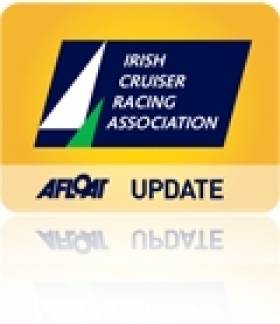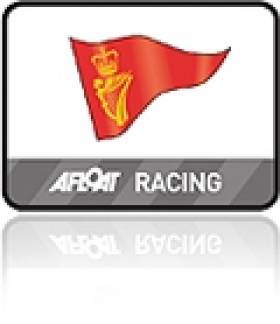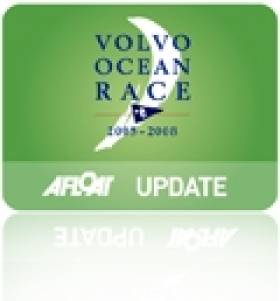Displaying items by tag: Club
Kinsale Yacht Club has won a blue flag for its coastal marina for the first time in today's An Taisce announcement of the International Blue Flag Awards for 2015.
A total of 144 awards were presented by the Minister for the Environment, Community and Local Government, Mr. Alan Kelly, T.D, at an awards ceremony held on Ballinskelligs Beach in Kerry. Ireland's diverse coastline with long sandy beaches, bustling promenades and rocky shores have something for everyone.
Kinsale Yacht Club marina is located in a natural, virtually land-locked harbour on the estuary of the Bandon River, approximately 12 miles south west of Cork harbour entrance. It is home to a thriving fishing fleet as well as frequented by commercial shipping, it boats two fully serviced marinas, with the Kinsale Yacht Club & Marina being the closest to the town.Visitors to this marina automatically become temporary members of the club and are therefore entitled to make full use of the facilities.
Speaking at the awards ceremony Minister Kelly said, "Blue Flags represent excellence. They are a clear signal of quality and are something to be cherished. I am delighted to announce that today we will be awarding a total of 86 Blue Flags; 81 for beaches and five for marinas. A blue flag flying at a particular location means that it has achieved excellent water quality to standards set by European and national Regulations, and a very high grade across a wide range of other criteria"
He added that, "This is testament to the sterling efforts of local authorities, An Taisce and of local communities in ensuring that their beaches meet the standards of excellence required for a Blue Flag or Green Coast Award',
81 beaches and 5 marinas were awarded the prestigious Blue Flag award representing an increase in 6 Blue Flag awards since 2014.
Ms Annabel FitzGerald, Coastal Programmes Manager said that, "The Blue Flag is an award of excellence, the beaches and marinas that have achieved this accolade today have complied with strict criteria relating to water quality, safety, facilities for visitors, beach management, environmental education and the provision of information."
In Cork, Redbarn and Garretstown have regained the Blue Flag status and in Wexford, Ballinesker is being awarded the Blue Flag for the first time. 5 beaches that failed to comply with the requirements of Blue Flag in 2014 because of storm damage have regained their Blue Flag status, they are Bertra and Mulranny in Mayo, Rossbeigh in Kerry and Miltown Malbay and Spanish Point in Clare.
Brittas Bay North in Wicklow, Enniscrone in Sligo and Skerries in Fingal have lost their Blue Flags due to failure to comply with water quality requirements for the Blue Flag.
58 beaches in Ireland were awarded the Green Coast Award representing an increase in 4 awards since 2014. Bishopsquarter and Seafield in Clare and Inchydoney East in Cork are being awarded for the Green Coast Award for the first time. In Wexford, Ballyhealy, Ballymoney, Booley Bay, Grange and St Helens Bay have also achieved the accolade.
Having not met the excellent standard required, Skerries in Fingal, Rathmullan in Donegal, Enniscrone in Sligo and Ballycastle in Mayo did not regain the Green Coast Award for 2015.
"The Green Coast Award recognises beaches for their clean environment, excellent water quality and natural beauty. These beaches may not have the necessary built infrastructure required to meet the criteria set for Blue Flag status however they are exceptional places to visit and enjoy our rich coastal heritage and diversity."
An important aspect of the Green Coast Awards is the involvement of Clean Coasts groups of which there are now 440 comprised of thousands of volunteers throughout the island. Ms FitzGerald, paid tribute to these groups stating that, "Clean Coasts groups contribute significantly to the protection of Irelands coast, in 2014 over 800 beach cleans took place and these groups removed over 500,000 items of marine litter from the marine environment."
"Local Authorities, Marina Operators and local communities should be commended for their efforts in achieving Blue Flag and Green Coast award status today" Ms FitzGerald concluded.
SUMMARY OF AWARDS
o 144 awards presented today, an increase of 10 on last year's number.
o 86 Blue Flags are being awarded today in the Republic of Ireland, 81 to beaches and 5 to marinas.
o This is an increase of 6 Blue Flags since 2014, representing an increase of 5 Blue Flag beaches and 1 Blue Flag marina.
o 58 Green Coast Awards are being presented today representing an increase of 4 Green Coast Awards since 2014.
o 6 beaches will be presented with both the Blue Flag & Green Coast Award achieving dual award status. These are Portmarnock, Portrane and Donabate in Fingal County Council; Salthill and Silver Strand in Galway and Rosses Point in Sligo.
BLUE FLAGS GAINED
Beaches (+8)
o Wexford: A Blue Flag is being awarded to Ballinesker for the first time.
o Cork: 2 Blue Flags were regained in Redbarn and Garretstown.
o Kerry: A Blue Flag was regained in Rossbeigh.
o Clare: 2 Blue Flags were regained in Miltown Malbay and Spanish Point.
o Mayo: 2 Blue Flags were regained in Mulranny and Bertra.
Marinas (+1)
o Kinsale Yacht Club has been awarded the Blue Flag for the first time.
BLUE FLAGS NOT AWARDED
Beaches (-3)
Blue Flag applications were received for the following beaches but we were unable to award the Blue Flag.
o Wicklow: Brittas Bay North did not comply with water quality requirements for the Blue Flag.
o Sligo: Enniscrone did not comply with water quality requirements for the Blue Flag.
Blue Flag applications were not received for the following beaches which did have the Blue Flag in 2014.
o Fingal: Skerries South Beach did not meet the excellent standard required for Blue Flag status.
GREEN COAST AWARDS GAINED (+9)
o Clare: Bishops Quarter and Seafield are being awarded the Green Coast Award for the first time.
o Wexford: Ballyhealy, Ballymoney, Booley Bay, Grange and St Helen's Bay are being awarded the Green Coast Award.
o Fingal: The Burrow is being awarded the Green Coast Award for the first time.
o Cork: Inchydoney East is being awarded the Green Coast Award for the first time.
GREEN COAST AWARDS NOT AWARDED (-5)
o Donegal: Rathmullan failed to comply with the water quality standards required for the Green Coast Award.
o Sligo: Enniscrone failed to comply with the water quality standards required for the Green Coast Award.
Green Coast Award applications were not received for the following beaches which did have the Green Coast Award in 2014.
o Mayo: Ballycastle in Mayo did not comply with water quality standards for the Green Coast Award.
o Fingal: Skerries did not comply with water quality standards for the Green Coast Award.
o Wexford: Ballinesker did not apply for the Green Coast Award but is in receipt of the Blue Flag in 2015.
Irish Sailing's New Strategic Plan Charts 2020 Course
#isa – Two years after a heave against the Irish Sailing Association (ISA) a new five year strategic plan has been published writes David O'Brien in this morning's Irish Times sailing column HERE.
The Plan is for the period 2015 - 2020 and is based on the views that were put to a 'Strategic Review Group'. The SRG was asked by the Board in 2013 to assess where the Association stood and how it needed to adjust to better serve the sport of Sailing. The Board accepted its Report and tasked a group to prepare a new Strategic Plan for the ISA based on its contents.
This blueprint (downoad the draft plan below as a 2mb pdf file) looks like a positive step forward not least because it makes an attempt to implement measurable targets for the good of grass–roots sailors. That rule was something lacking on a now scrapped 2020 vision document sub–titled 'grow the sport, grow the membership, grow the organisation'. This discredited plan turned out to be boom time folly and like so many other projects around the country at that time, poorly thought out and only half–built.
On foot of it, in 2013 a band of dissenting sailors held the ISA to account for its lack of performance. Back then, association efforts were more focussed on getting the ISA genie back in the bottle than the sport back on track. In a push for change at the National Yacht Club (NYC) in April 2013, the embattled body heard over 300 suggestions for change.
Not least was the fact sailing had lost a quarter of its members in recession and key yacht clubs are still in choppy financial waters. A massive fall off of junior sailors also presented an inconvenient truth that problems lay not with the children but with the paucity of guidance for newcomers.
Sailors like Norman Lee and Bryan Armstrong were joined by former president Roger Bannon (now its Treasurer) in calling for fundamental reform.
'The ISA has lost its way over the last few years," Bannon wrote in March 2013, giving his view of a bureaucracy 'detached from the reality of what is going on in the front line'.
Around the same time, County Wicklow dinghy sailor Lee said he wanted 'the ISA focus off elite sailing and the emphasis instead to be on enjoying sailing for fun as per the association's own articles of association'.
Two years on, an independent group of sailors has charted a new course but does this revised game plan satisfy these demands? Will it be a boost for clubs and classes, particularly smaller ones, or is the only comfort for them the fact that the process took place?
The underlying principle of the Plan is moving from a 'governance approach' to one of the principal stakeholders in the Sport working together with goal of encouraging and developing participation. The Association, Clubs, Training Centres, Classes and associated groups working in union to achieve those objectives underlies all of the strategies. There will be a renewed emphasis on utilising the input of volunteers to harness the skills and knowledge of active sailors so that the ISA can evolve and develop and respond to issues that arise.
The approach is in a logically presented format but there is very little that suggests the ISA will support ageing, less popular class associations, preferring rather to put faith in the bricks and mortar of clubs and training centres to strengthen access and participation avenues for current and potential sailors.
While many of the strategies are laudable, there will be difficulties in operating them, particularly where they are dependent on the vigour, enthusiasm and skills of volunteers at club level.
Indeed, there may be some instances where ISA aspirations are in direct conflict with local trends and activities. For example, what will the Optimist and Laser classes say to the strategy of 'encouraging participation of younger sailors in two person boats' or the dinghy classes about the strategy of encouraging crewing in keelboats.
The scenario will create debate about the professional structure required to deliver on its aspirations particularly in the training area. Suitably qualified personnel are necessary to negotiate the tricky waters disturbed by the demands of the multiple agencies with a stake in the sport and its delivery – HSA, Department of Transport, Department of Education.
At the same time it would appear that the working plan appears to validate the ISA's High Performance department as many of the strategies suggested are actually currently operational.
There are a number of curious omissions:
·No mention of Paralympic sailing in the High Performance section
·No mention of Youth Worlds, a fertile ground for ISA recently
·No mention of financing the association, strangely in light of the discussion around its joint membership scheme.
Where does the balance lies when gauging the benefit of an organisation producing a strategic plan – is it the outcome or the process that is the more valuable exercise? Or worse still, is it the creation of a stick to be beaten with further down the road if targets are not achieved.
The ISA has been fortunate in being able to rely on some excellent volunteer directors for the overhaul process. The combination of effectiveness and commitment of the new board has brought the association a long way in a short time but how sustainable is this voluntary effort over time?
One doer maybe better than forty talkers but effective volunteers are hard to find. Finding an ISA President a year ago was not without difficulty in itself. In the absence of such voluntary effort, and with the benefit of experience, can the professional staff see this new plan through or is more help needed?
As a draft, this document will no doubt undergo some change in the process that now follows. And while there have been some changes at the ISA's Park Road HQ, the evolution of the ISA from the Ursula Maguire administered one-person organisation of 20 years ago continues with a relatively minor correction of the set and drift that had crept in in recent years. Are more changes still to come? Will there be a replacement for the recently departed training director? Perhaps too someone is also needed to support the club racing side – maybe in conjunction with the Irish Cruiser Racing Association (ICRA)?
The appointment of Regional Development Officers to assist Clubs and Training Centres has been seen as one of the ISA success stories in recent years and it is proposed to increase their availability to Clubs and Training Centres. The Board has already decided to add a further RDO to the two existing appointments to ensure the local availability of expertise and advice and facilitate greater co-operation and coordination between local Clubs and with Training Centres.
The primary role of the Clubs in growing the sport locally, attracting newcomers and maintaining the interest of both existing and new members is acknowledged. Better linkages between Clubs and Training Centres for their mutual benefit are proposed. This is in the knowledge that most newcomers interested in taking up Sailing feel more comfortable in approaching a Training Centre than a Club but the long term involvement of sailors in the sport is best ensured by them joining Clubs, participating in Club activities and enjoying the benefits - both practical and social - that membership provides.
The over elaborate structure of ISA training courses and the difficulties of qualifying, retaining and upskilling instructors was a widespread complaint when the Review Group conducted their research. Strategies to resolve those problems are proposed.
An often expressed view about the Club Training schemes for Junior sailors is the amount of effort committed to running courses by Clubs and the relatively poor transfer rate from the courses to Club involvement and activity afloat. It is planned to refocus the training courses away from a 'certificate chase' to an emphasis on developing the skills learned. An online sailing passport scheme to supplement the paper based certificate system is proposed. It will be trialled in the coming season and will allow the recording of both course attendance and other time afloat, whether racing or leisure sailing.
A strategy of encouraging the training of young sailors in two person boats, as opposed to single handed craft, is proposed, with a view to improving both their technical and social skills. A renewed emphasis on sailing being a sport for life and avoidance of the risk of sailor burnout by compressing skills acquisition into young sailors' early teens, are envisaged.
The redressing of the perceived imbalance between the support structures for those competing in the non-Olympic area and those involved with the High Performance area - essentially the Olympic arena - is proposed. This will not affect the support for the High Performance sector, which is funded through the good offices of the Irish Sports Council, but will instead propose that the support available to other areas of competition will be enhanced. Better access for Clubs and Classes to coaching at local level is one of the principal strategies envisaged and it is hoped that Clubs and Classes will be able to access both coaches with a High Performance background and those with experience of specific Classes.
It is proposed that the ISA should re-commence the co-ordination of a racing event calendar to facilitate the avoidance of clashes between events and re-establish the balance between local, regional and national events.
Now the process of re-evaluation has begun, the ISA is urging all sailors to play a role to win back participation in sailing. A green light from clubs and classes is key to this plan's success.
The following regional meetings are taking place:
Wed 21 Jan 15 7pm-9pm Dublin, Royal St George Yacht Club
Tue 17 Feb 15 7pm-9pm Cork, Rochestown Park Hotel
Tue 24 Feb 15 7pm-9pm Galway, Galway Bay Sailing Club
Howth Yacht Club Autumn League Counts Down to Saturday Climax
#hyc – Howth Yacht Club's (HYC) leaderboard showed some small changes to the leaderboards yesterday within the nine classes, but no change to the idyllic conditions after week five of the MSL Park Motors Mercedes-Benz sponsored event that has enjoyed for every day of the event so far. With one last race to go, some of the divisions show clear winners, but most will see the overall results decided next Saturday when the series is completed.
In the one-design keelboat fleet, John Phelan and his team on their J80 lead that class after their second win in a row, but only by 2 points from the Flynn-Buckley team. A first place in the Puppeteer Class for Alan Pearson and team on his Trick or Treat won't be enough to threaten the lead of the Walls-Browne partnership and crew on Gold Dust. Their 3 wins earlier in the scratch series will prove to be unassailable when the results emerge even after next week's race. Cyprian Feeley's Cloud 9 will have to be struck by very bad luck if Ibis manages to catch up in the Puppeteer handicap division, as Susan Sheridan's team will have to win next week and hope that Cloud 9 finishes in worse than 8th position if they are to sneak ahead.
With the class competing in next week's Freshwater Keelboat Regatta in Lough Derg, the Squib Class result is final with Fergus O'Kelly's Selik winning the scratch prize and Ronan MacDonell's Fantome victorious on handicap.
Brian and Conor Turvey's Isobel's won this week's Howth 17's race, positioning their classic one-design within 2 points of the leading boat - Marcus Lynch and John Curley's Rita. Deilginis sits one point behind in third, but the maths mean that they are now unable to win the overall next week. In their handicap division, Tom Houlihan's Zaida will surely have to give its all next week if they are to pass out the consistent Sheila, who's skipper Mary Faherty has put the youngest 17-Footer seven points ahead.
In Class 1 IRC, Norbert Reilly and Alan Chamber's win on Crazy Horse halted the seemingly unstoppable J109 Storm (Pat Kelly) who had to be content with a 3rd place following Ross McDonald's Equinox finishing 2nd. The Equinox crew will also have to settle for second in the ECHO division, as Storm's domination of Class 1 will now see its crew collect both IRC and ECHO overall prizes next week.
Despite a late charge by the Colwell-Cobbe owned Fusion, Anthony Gore-Grimes and his crew on Dux will certainly win the Class 2 ECHO prize at the end of the series, but they are being pushed all the way in the IRC division by Mike and Ritchie Evans' The Big Picture, followed one point behind by Jonny Swan and Peter Freyne's Harmony.
The closest leaderboard would appear to be in Class 3, with both IRC and ECHO divisions split by only a few points. Vince Gaffney's Alliance II is being pushed all the way by the J24s Scandal (Brian McDowell) and Kilcullen (HYC's Under 25 team) in IRC, while Scandal and Lionel McMurtry's Hellyhunter sit closely behind Kilcullen going into the last race.
Colm Bermingham and crew on Bite the Bullet won their race in Class 4 IRC, but Tiger (Stephen Harris and Frank Hughes) still lead by a slender margin of 2 points while David Sargent's Indulgence will win the ECHO prize next week. In Class 5 ECHO, Harry Byrne's Alphida and Gordon Knaggs's Jokers Wild are neck-and-neck going into the final race, but Kevin O'Byrne's Mary Ellen5(mathematically) could still manage to win. The Class 5 IRC division also sees Alphida in the running, but needs to catch leaders Jebus (Emmet Dalton) following their win this week.
In the Mini Series event, many of the existing leaders in the various classes remain on top of the results list, however Paul Colton's Cri-Cri has managed to make an impression in Class 3 and contends the lead in IRC while leading on ECHO. A 3-way tie in the Class 1 ECHO mini series between Crazy Horse, Dear Prudence (Patrick Cruise O'Brien) and Equinox will make for an exciting end to their racing next week.
This week's prizes were presented by MSL Park Motors Mercedes-Benz Business Development Executive Patrick Manning, who also clearly enjoyed taking part in the racing on board Declan Gray's Sapphire.
#dinghydecline – The current debate regarding dinghy racing is fascinating (See original article and reader comments here). At present the discussion is centred around the role of the national authority. However, I believe that as the debate develops we will be asking as many questions of the clubs as of the ISA.
What is a sailing club for? The question is not often asked, because for most people the answer is obvious... until they realise that other members are giving very different answers. For some a club is a place where they can socialise with like-minded people, while also providing some facilities to assist them in maintaining and using their boat (the bar and the boatman being the heart of the club). At the other extreme, many Continental and American clubs believe that they exist to provide sailing, which includes boats, for the local and visiting populations. As such they run large fleets of dinghies and keel boats.
The current debate questions whether the ISA does enough to keep the numerous apprentice sailors within the sport of sailing, and in particular orientating them towards racing in dinghies. Unfortunately, whilst many statistics have been bandied about (and I note that Bryan Armstrong's estimate of a core of some 300 young racing sailors corresponds with my estimate given in a previous article, based on the number of students team racing) I have yet to see the essential figure: how many sailors move from beginner to being able to sail a boat round a triangular course in, say, a Force 3. These are the teenagers and adults that could be attracted to club racing in dinghies or small keel-boats.
In an ISA approved training centre these beginners will have reached this level using the boats, and often wetsuits, life-jackets and other gear provided (this may not be true in some club-run training programmes). Beginners will be in a group led by a qualified instructor who structures activities in light of his student's progress. They are only committed to a course lasting a few days and proceed to the next level only if they wish to do so.
What are clubs asking of these same beginners who arrive waving their still new ISA certificates? If the answer is:
take out annual membership;
buy a boat, and all the gear;
pay the club for boat storage;
be expected to sail most weekends in the club;
commit to"volunteering" to run racing and other club activities;
just like all the more experienced members, then it is little wonder that very few beginners take up this offer. These should be objectives not expectations.
Managing this transition from sailing school pupil to active club sailor is increasingly complicated, and should be a major preoccupation for all clubs. "Sailing families" will have already adjusted their life-style and family budget. The group disparagingly known as "Oppie parents" (a group not limited to that particular class) will make great sacrifices, in both time and money, to take their children sailing. But a teenager who may be the only family member interested in sailing will face multiple obstacles. For the new-comer a sailing club can be an off-putting place.
Not the least of these obstacles is the change in the way we allow our children to interact with other adults. Imagine, for instance, the child protection issues raised by any development of dinghy sailing based on young people crewing for adults. This was the traditional method for gaining experience and learning the game, many of us learned this way. Times have changed – I am not sure that many parents today would be happy about their child spending long hours with an un-vetted adult on a small boat, let alone spending a weekend away for an open meeting or championship.
Assisting apprentice sailors in this passage from learner to participant is a process that may take as much time and effort as teaching sailing. Up to now we have assumed that if someone learns to sail they will become a full participant in an existing model of sailing club. Regrettably, there is considerable evidence that this is not happening. New sailors, young and old, need to be brought at their own pace in to our clubs. Doing this successfully will ensure the future of clubs, but will inevitably induce changes in the way clubs function.
Take a model common in France, and elsewhere in Europe: after completing a cursus in the club sailing school, sailors join the club "sport school". Here, with a combination of training and appropriate competition, sailors learn not only the techniques and the tactics, but also the discipline required to succeed. They are assisted as they discover the commitment required to race regularly, they develop the habit of competing, of travelling to events, and so much more. As they are competing with other sailors of the same age and experience there is no arms race. Indeed, as the teenagers will soon move on to another boat, as they grow and improve, logically the boats belong to the clubs.
Only when sailors have reached a suitable level do they join the regatta circuit. One feature of racing in Europe, that may seem strange to Irish club members, is that club racing is not a central activity. Dinghy and keel-boat sailors either train with a club coach or sail at open meetings. The idea of racing once a week in your local club is not part of the culture. Is it possible that one problem in Ireland is that there is too much racing? If every weekend confirmed sailors are competing for club trophies when do they train, and, more importantly, when do they spend time assisting new sailors.
Running a transition programme may be a complicated exercise for clubs. Financing the acquisition and the maintenance of a fleet of suitable boats is a challenge. The ISA could contribute by setting up a training programme in basic boat maintenance, that should be compulsory for instructors and coaches. But clubs have taken up this challenge. For instance, two very different organisations have long maintained fleets of dinghies for team racing – the FMOEC in Schull and the Royal St George YC. This year the Sailfleet J80s will be managed by a single club. The Dun Laoghaire waterside clubs are gradually acquiring a fleet of keel-boats. These initiatives should lead other clubs to reflect and develop their own projects. The emergence of such projects will inevitably lead to new demands on our national authority, who, as always, should play a major role in facilitating new developments - Magheramore
For more dinghy sailing articles from Magheramore see:
Casting a fly over sailing club memberships
Is 'Adventure Sailing' a New Tack for Dinghy Sailors?
More articles on the same subject:
Another fresh day for Howth's Spring Warmer second series
#HOWTH YACHT CLUB – It was another fresh day for the fleets contesting the second series of races in the Key Capital Private Spring Warmers at Howth YC last Saturday, although the north-westerly winds and flat seas made the going a little easier than the previous Saturday.
Some things didn't change, with Class 1, Etchells and J/24s being topped by double-winners on the day. Pat Kelly's Storm headed Ross McDonald's Equinox in both Class 1 races while Dan O'Grady's Kootamundra had a similar success in the Etchells to open up a three point lead over Fetching (Quinn/O'Flaherty).
After a DSQ for sailing through the finishing line on the last downwind leg last weekend, J/24 national champion Flor O'Driscoll in Hard on Port got back to winning ways in both races, beating Mossy Shanahan's Crazyhorse and Fergus O'Kelly's Jibberish into second place respectively.
Having missed the opening day, Sharkbait (Duncan/Moran) had a couple of minutes to spare in both SB3 races, beating RStGYC visitors Seriously Bonkers (Cuppage/Lee) in race 1 and then Dinghy Supplies (Shane Murphy) in race 2, with the latter now heading the overall standings by seven points.
Kevin Darmody's Gecko and Starlet (Bourke & Others) effectively had a match race in Class 3 and it was honours-even after two races, with only a point between them overall. In the Puppeteers, Gold Dust (Walls/Brown) won the first race from Harlequin (Clarke/Egan), who had to be content with another second in race 2, this time behind Trick or Treat (Alan Pearson), the series leader now going into the final day.
There was no racing in Class 2 or Squibs.
The final two races in the Key Capital Private Spring Warmer series are scheduled for next Saturday 28th April.
Sailing Clubs Must Support Struggling Members
Last month AIB pulled the plug on sailing club fees for staff. Next month the Irish Sailing Association aims to rejig the annual fee it charges to clubs at an egm. They are signs that the necklace of over 70 yacht clubs around the coast and on inland waters are under financial pressure. No wonder as the cost of going sailing, as well as many other sports in Ireland, proves too much to bear for many families.
In his recent column (below) in the Evening Echo Marine Correspondent Tom MacSweeney highlighted the need for Sailing Clubs around the coast to do all they can to help struggling memberships.
Membership is becoming an issue for sailing clubs to judge from what club officers around the coast have been telling me. It is a sign of the economic times. Families and individuals have to examine closely what to do with the money they have left after the government has raided their incomes.
I have been told that club members and particularly those holding family memberships are looking at how much they pay for an inclusive membership and reducing it to just one individual membership. Others have told me that they are faced with deferring payments or foregoing membership altogether.
Clubs are responding to the situation in different ways.
While the more realistic are taking steps to deal with the issue, there are indications that others are ignoring a situation that, it appears, could affect the popularity of the sport. This may be from an entrenched position or snobbish attitude where they don't want to admit difficulties in public. An inadvisable situation when income is being squeezed and the future challenged.
Payment systems such as monthly standing orders, direct debits, concessions for early payments, have been introduced by those clubs realistically dealing with the situation. Sailing is not the only sporting activity being affected, I hear of golf, rugby, soccer and other clubs feeling the pinch of reduced incomes, soaring taxes and charges levied on household incomes by the government. Something has to give because there is a limit to the amount of money people have. Government politicians seem incapable of understanding that people have not got enough money or sufficient disposable incomes because of the State raping their salaries.
Another aspect of the impact of deteriorating income levels appears to be the demand for marina spaces, with boat owners not as active as they had been in seeking berths and telling me frankly they cannot stretch incomes to afford prices during high season. Some boatyards are feeling the effects also around the country, as are yacht sales. A lot of boats are for sale and replacement plans by sailors who had planned to upgrade have been put on hold.
The oldest yacht club in the world, the Royal Cork at Crosshaven, has been responding to the challenging times. Last season it introduced a monthly membership scheme and a crew membership system as an innovative response to the challenge which the sport faces.
When he took over as the club's new Admiral at its annual general meeting last Monday night in the Crosshaven clubhouse, Peter Deasy acted immediately, announcing that the club would take further steps to address the issue.
He has taken office for a two-year period in succession to Paddy McGlade, a post which follows his successful leadership of the last Cork Week two years ago when he was Chairman. Cork Week will be held again this year, from July 7 to 13.
"There is a membership challenge, it is one facing all clubs in these times and it will be addressed by this club," he said. He stressed the importance of encouraging more people into sailing. The club is to carry out a review of its membership system, amongst other steps. On Monday night members approved an increase in subscription levels for those over 65, who pay a reduced rate as 'seniors,' as is the situation in many clubs.
The RCYC is taking a realistic, determined approach toward what is an issue born of these difficult national economic times. Peter Deasy also emphasised the importance of encouraging young sailors and keeping them within the sport.
This is a topic I have addressed before. Not every young sailor will reach the top competitively, but all are needed to remain in the sport in this island nation. When they emerge from dinghies there is a difficulty, experienced in many clubs around the coast, of maintaining their involvement.
Sean Flood, Wicklow Sailing Club
#WICKLOW – Wicklow Sailing Club has been stunned by the sudden and tragic death of its former commodore Sean Flood.
Sean's funeral took place yesterday at 11 a.m. in St. Patrick's Church followed by burial afterwards in Rathnew Cemetery.
According to local reports he was last seen on Friday afternoon in the vicinity of Wicklow Harbour. His body was recovered later by divers on Saturday.
Sean, who was in his late fifties, was a prominent Wicklow businessman. He was a long-time member of Wicklow Sailing Club, where he previously held the titles of commodore and vice-commodore.
Flags at the Sailing Club flew at half mast in his honour.
The Wicklow People has more on this sad news here.
Howth Plans Big Event for 2012 ICRA Nationals
ICRA – the 2011 Club of the Year – laid out its stall until 2014 at the eighth annual conference in Dun Laoghaire at the weekend and the momentum is already building at Howth Yacht Club (HYC) who stage the 2012 National Championships at the beginning of next season.
The country's biggest yacht club has a potential sponsor in the wings and Saturday's conference also heard from the Club's Norbert Reilly that HYC is adding feeder events around the two day championships from May 25/27 to double the attraction of the North Dublin venue.
The Corby Cup will be sailed the weekend prior to the Nationals (19-20 May) and the Irish sea offshore body, ISORA, will stage a feeder race from Conwy in Wales to Howth. Both initiatives will encourage UK boats to travel to Dublin for the ICRA series.
Typically the ICRA event attracts over 100 boats in four different classes.
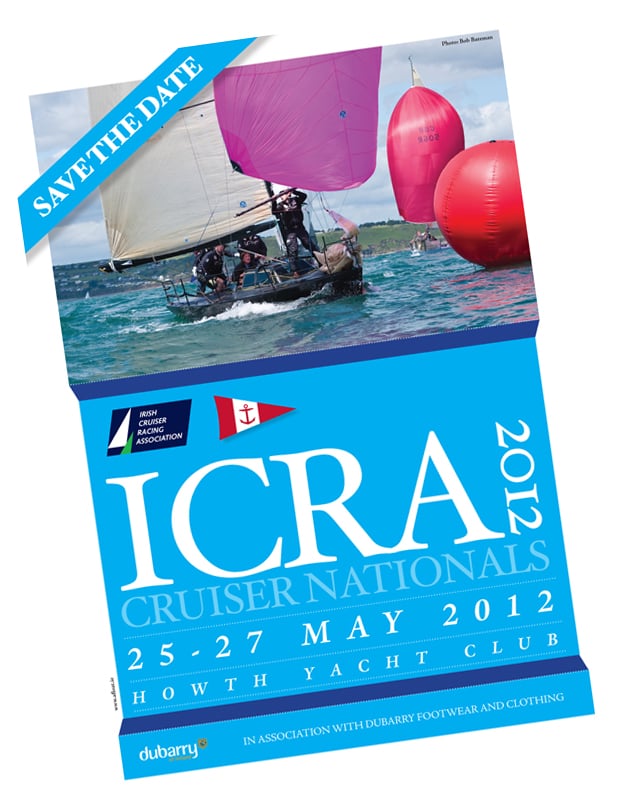
In spite of a dip in the size of the Cruiser fleet in Howth in recent years local boats are still taking some of the big prizes nationally with Reilly's Crazy Horse the 2011 Volvo Dun Laoghaire and DBSC Cruiser Challenge winner and Pat Kelly's J109 Storm picking up the weekend conference's top 'Boat of the Year' prize.
Ashore there are plans to make the event family oriented and a 'ladies lunch' is also planned.
The weekend's ICRA conference decided to do away with the crew limit rule for the seven race series in Howth as the association focuses on getting more crews out on the water to enjoy cruiser racing.
The ICRA Nationals goes West for a return visit to Tralee Bay Sailing Club in June 2013 and in 2014 the National Championships will be staged by the Royal Irish Yacht Club in Dun Laoghaire.
In the normal cycle of things 'the ICRAs' should be heading to the south coast again in 2015 but so far, the conference heard, the association is open to offers.
The 2012 ICRA Notice of Race for the Howth Championships will be available on Afloat.ie shortly
Crosbie's 'No Excuse' Awarded Royal Cork's Boat of the Year Prize
#ROYAL CORK YACHT CLUB – A leading Munster sailing figure has been deservedly recognised for his contribution to sailing.
Ted Crosbie with his Neils Jeppesen-designed X-yacht 'No Excuse' was awarded the Royal Cork Yacht Club's 'Boat of the Year' trophy at the recent Crosshaven prizegiving.
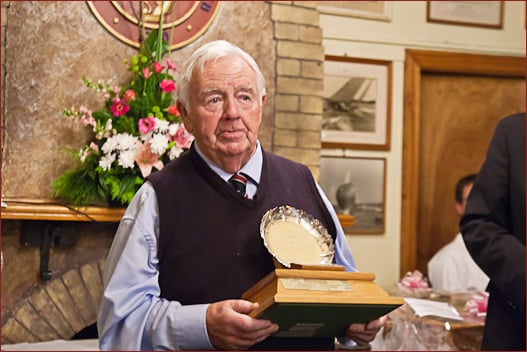
Former Club Admiral Ted Crosbie lifts RCYC's Boat of the Year Award for 2011. Photo: Bob Bateman
Galway Revives Ancient 'Royal' Yacht Club
The 'Royal Galway Yacht Club' (RGYC) was established in 1892 but had not been heard of for quite some time. But in 2011 it has set sail again, becoming the latest Yacht Club on the Irish sailing scene and an addition to the clubs operating on Galway Bay.
It has four flag officers (three Commodores and one Admiral) and it will have 'no royal aspirations'in spite of the name according to promoter Enda O'Coineen.
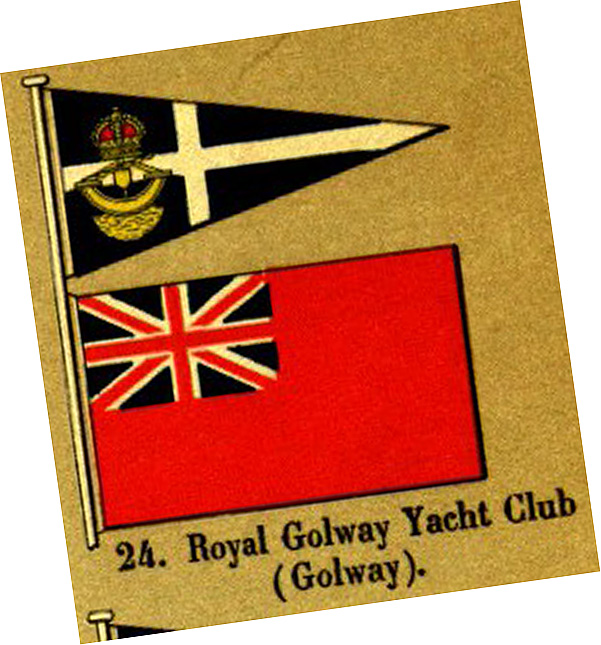
An 1800s representation of the club burgeee
In an open letter sent recently to VOR supporters, O'Coineen says the RGYC has been revived as 'a slightly unconventional club'.Anyone taking matters too seriously in the newly revived club Afloat.ie understands runs the risk of being 'black balled'.
Presumably what a yacht club in the Republic of Ireland cares to call itself is no longer of any concern to the British Home Office?
The club's intended purpose now is to promote youth sailing.



























